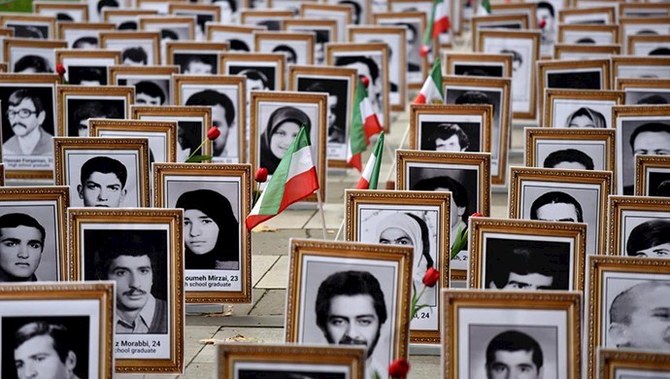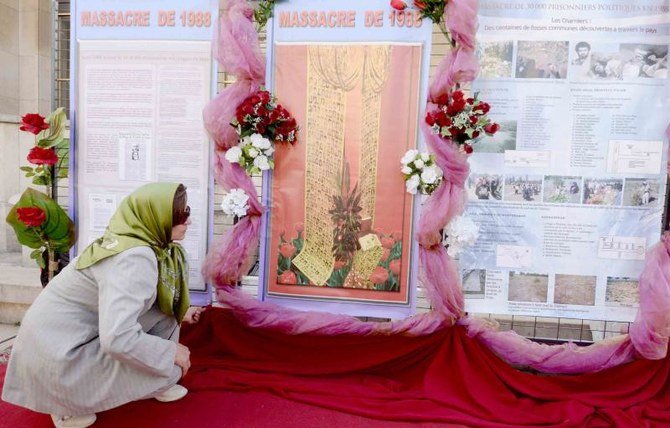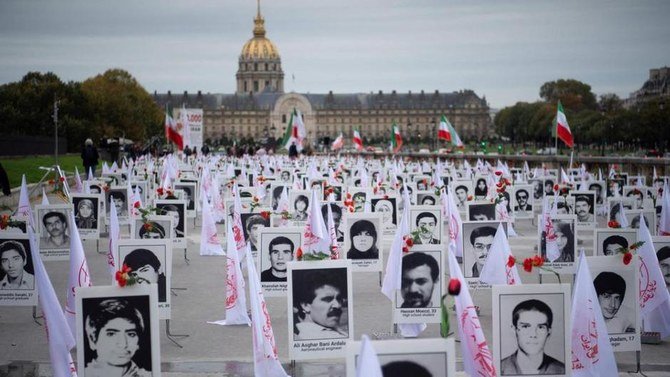LONDON: Families of Iranian political prisoners executed by the regime in 1988 have gathered outside a Tehran cemetery to commemorate their lost loved ones and call for accountability over the killings.
The cemetery in the neighborhood of Khavaran holds the unmarked mass graves of an unknown number of supporters of Iranian opposition groups.
On Thursday, families of slain members of the People’s Mojahedin Organization of Iran (PMOI) carried pictures of their murdered loved ones, laid flowers at the unmarked graves and chanted slogans against Ebrahim Raisi, head of the country’s judiciary.
In 1988, thousands of PMOI supporters were summarily executed by Tehran, in a mass killing that the UN and rights groups have said constituted crimes against humanity. Then-Supreme Leader Ruhollah Khomeini issued a religious edict ordering their execution.
READ MORE
The families of thousands of Iranians executed and buried in mass graves have written to the UN and world leaders urging them to prevent Tehran’s ongoing destruction of their last resting place. Click here for more.
Tehran has been accused of trying to hide evidence of the killings, for example by repurposing mass graves used for execution victims and instead forcing ethnic minorities to bury their dead in them.
However, momentum for accountability over the killings has been steadily growing. On May 4, more than 1,100 family members of those murdered penned an open letter urging the UN, US and EU to take urgent action to prevent the destruction of the graves and evidence of the killings, and to hold the regime accountable.
Furthermore, over 150 former UN officials, human rights and legal experts called on UN High Commissioner for Human Rights Michelle Bachelet to open an independent inquiry into the killings.
READ MORE
More than 150 former UN officials and human rights experts have demanded that the UN conduct an inquiry into the 1988 massacre of political prisoners in Iran. More here.
Ali Safavi, a member of umbrella opposition group the National Council of Resistance of Iran — of which the PMOI is a part — told Arab News that it is “imperative” that Bachelet “establishes an international commission of inquiry into the 1988 massacre.”
This “would enable investigators to go to Iran and visit Khavaran cemetery and mass graves in other Iranian cities as part of their investigation,” Safavi added.
“Those directly involved in the massacre, including current officials such as Raisi and Justice Minister Alireza Avaei, must be held accountable.”
Safavi said the protesters’ focus on Raisi is unsurprising given his outspoken and ongoing support for the killings, as well as his ascension through the regime’s upper echelons.
Rumors continue to circulate that Raisi will soon throw his hat in the ring for June’s presidential election.
Safavi said since becoming head of the judiciary in 2019, Raisi has directed the execution of at least 500 people — including, allegedly, Navid Afkari, the champion wrestler hung for participating in anti-regime protests.
Amnesty International said under Raisi, the judiciary has used the death penalty “as a weapon of political repression against dissident protesters and members of ethnic minority groups.”





























